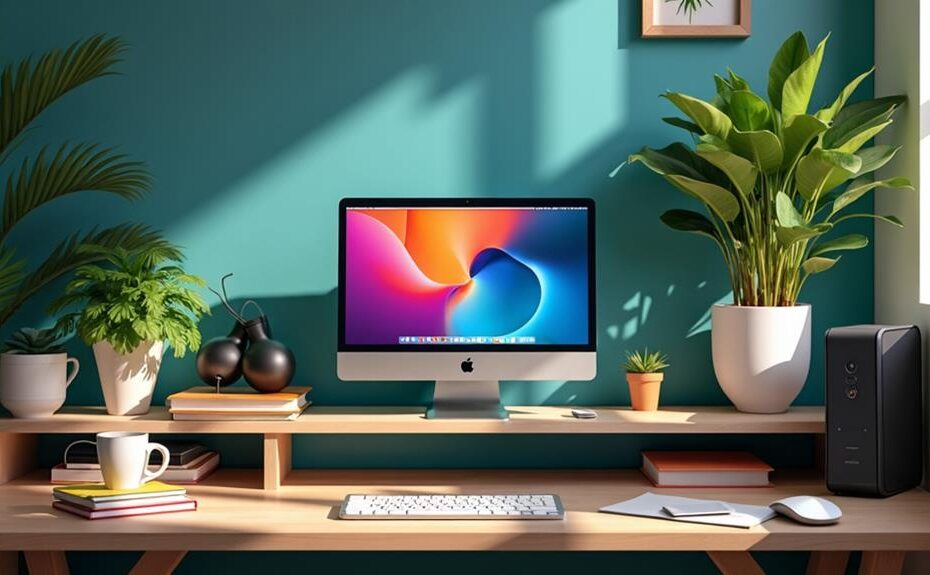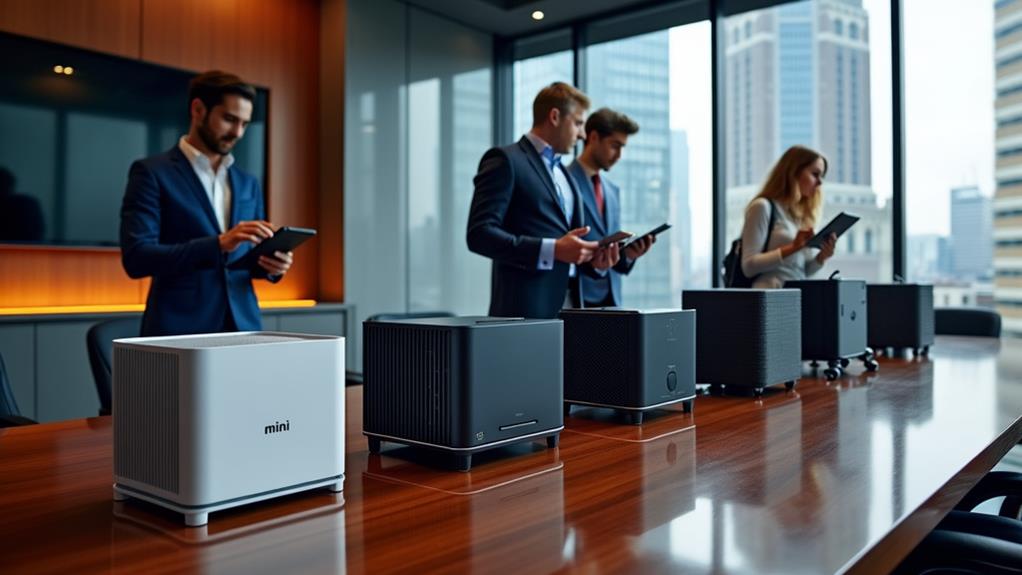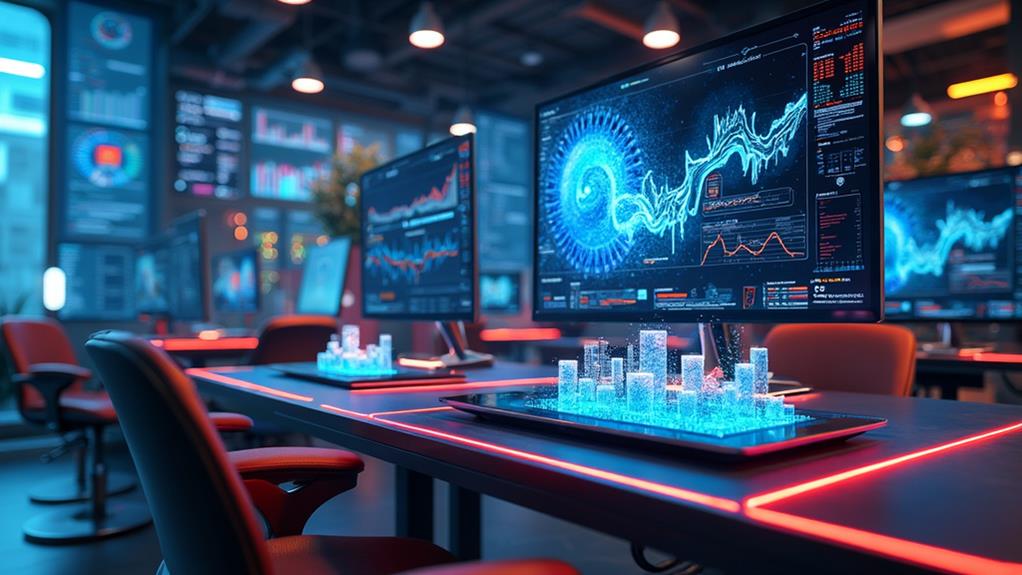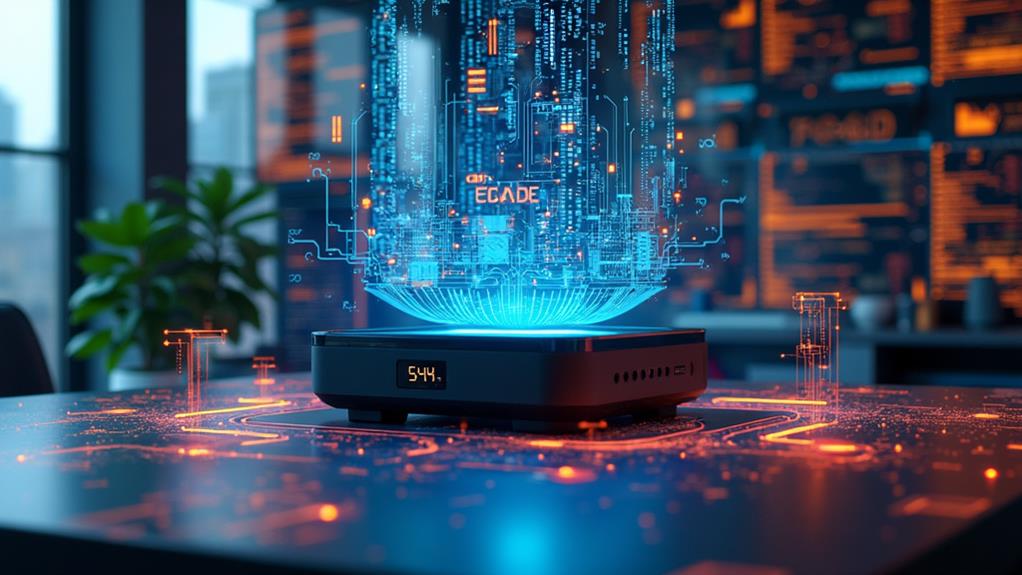



Yes, a Mini PC can replace traditional office desktops for many users. Their compact design makes them ideal for small spaces, and they provide sufficient processing power for general tasks and light multimedia applications. While they excel in energy efficiency and cost-effectiveness, keep in mind that Mini PCs may lack the upgradeability and top-tier performance of traditional desktops, especially for resource-intensive tasks. If you're mainly using office software and need a versatile, space-saving solution, Mini PCs could be a great fit. Explore further options and features to determine the best choice for your needs.
Key Takeaways
- Mini PCs offer compact designs ideal for small office spaces, making them suitable alternatives to traditional desktops.
- They provide adequate processing power for general office tasks and light gaming but may struggle with high-demand applications.
- Mini PCs are energy-efficient, leading to lower utility bills and making them budget-friendly for long-term use.
- Limited upgradeability in mini PCs can restrict long-term performance improvements compared to traditional desktops, which are more scalable.
- Mini PCs integrate well into existing office setups and support multiple connectivity options for versatile peripheral use.
Overview of Mini PCs
In recent years, mini PCs have emerged as a compelling alternative to traditional desktops, especially for users seeking efficient computing in limited spaces. Their small size makes them ideal for small offices or home workspaces, where every inch counts. These compact devices often utilize powerful processors, like Intel Core chips, enabling them to handle standard office tasks, multimedia applications, and even light gaming effectively. Furthermore, the latest mini PCs can be tailored to meet specific performance needs, whether it's for web browsing or more demanding applications, making them versatile for various user requirements assessing mini PC requirements.
One of the standout features of mini PCs is their energy efficiency. They consume considerably less power than traditional desktops, which can lead to lower utility bills over time. This aspect not only benefits your wallet but also contributes to a more sustainable computing environment.
When it comes to performance, mini PCs are surprisingly capable for general office applications, making them a viable alternative for many users. While they may lack the upgradeability of traditional desktops, they still provide sufficient power for everyday tasks. Additionally, mini PCs come equipped with multiple connectivity options, such as USB-C, HDMI, and Ethernet ports, offering versatility for connecting various peripherals and networks. This combination of compact design, performance, and energy efficiency positions mini PCs as a smart choice for many computing needs today.
Advantages of Traditional Desktops
Traditional desktops offer significant advantages that make them a strong contender in the computing landscape. One of the key benefits is their scalability, allowing you to customize hardware configurations easily. This means you can add more RAM or storage as your needs evolve, a flexibility often limited in mini PCs. Their superior cooling systems guarantee stability during prolonged and resource-intensive tasks, reducing the risk of overheating, which can be a concern with compact designs. Additionally, traditional desktops typically feature efficient thermal management systems, which enhance their ability to handle demanding multitasking scenarios without performance degradation.
Moreover, traditional desktops provide extensive expansion options. You can integrate additional storage, multiple monitors, and dedicated graphics cards, making them ideal for demanding applications like video editing and CAD design. These systems generally deliver higher performance levels, which is vital for multitasking and high-demand applications, outperforming mini PCs in scenarios that require consistent high performance.
Additionally, traditional desktops offer remarkable upgradeability. This means you can invest in higher performance over time without needing to replace the entire system. As a result, they often provide better long-term value, making them a more economical choice in the long run. Ultimately, their combination of power, flexibility, and longevity makes traditional desktops a compelling option for many users.
Performance Comparison
When comparing performance, mini PCs can surprisingly match traditional desktops in processing power, yet their compact size introduces limitations that may affect high-demand tasks. While these mini devices efficiently handle general office tasks and multimedia applications, they often lack dedicated graphics cards, which can hinder performance in graphics-intensive tasks like video editing or CAD design. Additionally, mini PCs can efficiently run virtual machine software with optimized resource allocation, making them suitable for diverse workloads in office environments, particularly when considering adequate RAM and storage upgrades to enhance performance. You'll find that many mini PCs support up to 64GB of RAM and include SSD storage options, providing sufficient memory and speed for most productivity scenarios. However, traditional desktops can be customized for higher configurations, giving them an edge in demanding environments.
The compact design of mini PCs allows you to multitask effectively in office settings, but their limited upgradeability restricts long-term performance improvements compared to traditional desktops, which offer extensive expansion options.
Cost Considerations
Many businesses find that mini PCs offer a compelling cost advantage over traditional desktops. With lower initial costs, mini PCs are particularly attractive for budget-conscious companies looking to minimize upfront investments. This affordability extends beyond the purchase price; the total cost of ownership often decreases due to their energy efficiency. Mini PCs consume less power, leading to considerable savings on energy bills over time, especially in environments with multiple units deployed.
While you may need to factor in additional costs for peripherals and connectivity, traditional desktops frequently require pricier hardware upgrades to keep up with evolving performance needs. In this regard, mini PCs present a more cost-effective solution. Additionally, they typically incur lower maintenance costs. Their compact design simplifies mobility and reduces clutter, making them easier to manage and maintain than larger desktop computers.
Ultimately, when weighing cost considerations, mini PCs can greatly lower your operational expenses while meeting your business needs effectively. By opting for mini PCs, you might not only save money upfront but also enjoy ongoing savings that traditional desktops simply can't match.
Integration and Support Options
Mini PCs not only offer cost advantages but also excel in integration and support options, making them a practical choice for modern office setups. These compact devices can seamlessly merge into existing office environments, functioning as remote desktops or home servers, which enhances flexibility in work arrangements. Their advanced virtualization capabilities allow you to run multiple applications simultaneously, catering to diverse user needs without compromising performance.
In terms of connectivity options, mini PCs often include various ports like USB, HDMI, and Ethernet, ensuring compatibility with standard office peripherals. This adaptability makes shifting from traditional desktops hassle-free. Additionally, the energy efficiency of mini PCs stands out, as they consume less power, contributing to lower operational costs.
Network security is another critical advantage, with enhanced features such as regular updates and user-friendly interfaces that promote a secure computing environment. When it comes to customer support, mini PCs typically provide thorough assistance through email and phone, alongside extensive online resources for troubleshooting. Together, these integration and support options position mini PCs as a compelling alternative to traditional desktops in today's dynamic office landscapes.
Disclosure: As an Amazon Associate, I earn from qualifying purchases.




